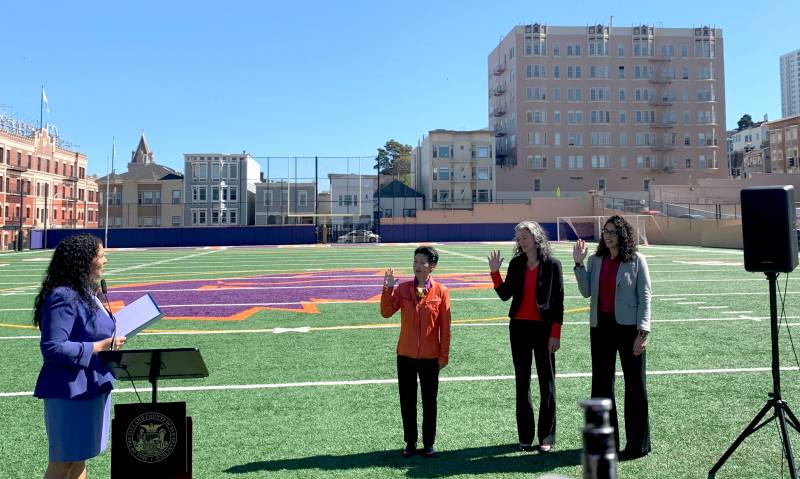“Being a first-generation immigrant, I also want to lift up the concerns and interests of the significant immigrant parents community in SFUSD,” said Hsu, who lives in the Richmond District, and started her own business after emigrating from China.
Motamedi, from the city’s Inner Sunset neighborhood, also has firsthand experience working with San Francisco’s school district, where she helped to oversee school spending as a co-chair of the district’s Public Education Enrichment Fund committee. She also served as a member of its Local Control and Accountability Plan task force.
“My focus is to bring my experience and our collective experience to help all families and children in this city to get the support they need as we do the really, really challenging work to get our district back on track,” she said.
Weissman-Ward, Breed’s third appointee, lives in the Mission District and is associate director of the Stanford Law School Immigrants’ Rights Clinic. Joining the board after years of contentious meetings that have at times erupted in bitter clashes among members, parents and students, she underscored the “importance of process.”
“I’ve learned the value and importance of investing time into building rapport in order to better find common ground,” she said. “Because if even at the outset we don’t agree, when we engage in a process that’s thoughtful, that’s transparent and that’s fair, we’ll be in a better position to move things forward.”
The new superintendent and board will be tasked with long-standing issues, such as falling enrollment and racial gaps in academic achievement.
The district also is currently trying to solve problems with a new payroll operating system it began using in January. The transition to the new program has left some 200 educators either underpaid or without checks at all, and is causing problems for nearly 1,000 more, according to the United Educators of San Francisco, which is threatening a class-action lawsuit.
Also looming large are the final budget cuts that need approval to solve the district’s $125 million budget deficit. The outgoing board approved all but $3.8 million in cuts, refusing to lay off some 47 paraeducator positions. Instead, it asked the district to cut more management positions, and delayed delivery of its second interim budget report to the state — which it now must submit by March 22.
“As we fight for the schools our students deserve, we look forward to working with the 3 BOE appointees,” the city’s teachers union said in a statement. “Educators know our students deserve stable, staffed & funded schools to thrive and hope the BOE is prepared to work with educators, families & our communities to achieve this.”
Despite waning COVID-19 case levels in the city, the pandemic continues to pose challenges to how schools are run. Beginning on March 14, indoor masking will be optional for the district’s middle and high school students, with elementary schools following suit on April 2.
However, some parents of children who are immunocompromised continue to speak out against the policy change, and the new board will certainly be managing how the district responds to any future variants. Frustration over the district’s decision to delay reopening schools during the pandemic was a major factor fueling the recall movement.
Perhaps the most politically fraught issue facing the new board members, however, is the admissions policy at the city’s elite Lowell High School. It remains to be seen whether the new board will bow to intense pressure from some parents and alumni to reinstate the school’s merit-based admissions policy, or keep in place the new lottery system, which has helped significantly increase the number of Black and Latino students in this year’s freshman class.
Despite arguments from the Lowell Alumni Association, the district has maintained that a return to admissions based on academic performance would violate state law.
In response to questionnaires from the supporters of the recall campaign, Hsu and Motamedi both said they would support reinstating Lowell’s merit-based admissions process.
Weissman-Ward stopped short of saying where she stood on the issue.
“As a general matter I’ll say I support equity, I support access and I support academically rigorous programs and I think as many people that can be a part of that is what I support,” she said on Friday. “And we probably need to be lifting up and having more schools that are able to allow students to have these academically rigorous programs.”



